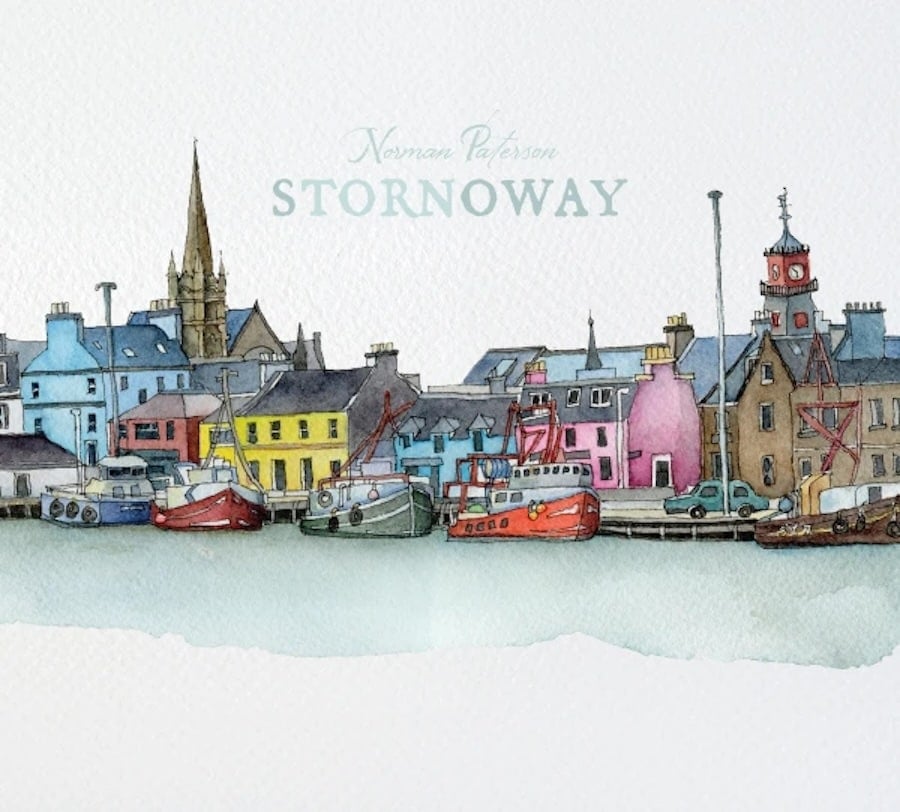
A late bloomer, Norman Paterson released his debut album, the critically acclaimed Torn, last year at 65. Now, making up for lost time, Stornoway is the follow-up. As the title suggests, it again forms around memories of and tributes to his home, drawing on traditional folk, although musically, this time round, he’s introduced drums, electric guitars (from Astrid’s Willie Campbell) and piano to the mix to add extra power to his fingerpicking. The singalong crowd-friendly melodies and hooks are once more in plentiful evidence, and even when the songs touch on melancholic issues, the musical mood is always upbeat.
As with his debut, the ambivalence of the tug between staying and leaving is clearly felt, the album bookended by two versions of the simple ripplingly fingerpicked Sailing Away, where he sings, “Every time I leave/I leave part behind/And it doesn’t get any easier/No matter how many times”. The song mentions the Suilven, the ferry that served the Stornoway to Ullapool route from 1974-1995, and the whole album is peppered with such local references and, indeed, the accompanying booklet has a glossary at the front, even noting a pair of shoe shop brothers (The Smiths) who ran the door at the local dances.
Memories of childhood flood through the accordion sway and drum beat of Back On The Rock, from watching the moon landing on a TV and the pipes and drums marching through the town to being with mates downtown and savouring the first taste of booze, fags, the company of girls and Rod singing Maggie May. The track mentions the Rendezvous Café, which also happens to be the subject of the jaunty What Became Of The Renden, an excursion into nostalgia which also namechecks The Lido, a local Italian, with long-forgotten memories of playing the jukebox and hoping a certain girl might show her face.
Yet more nostalgia, I could hear The Proclaimers playing Luskentyre, the title referring to a local beach and the song recalling a summer of innocent fun and romance with corned beef sarnies and Lipton’s tea and a wish to be able to go back. This, indeed, is the theme of the equally bouncy beat I’m Going Home, returning to where “old friends will stop me on the street/Smile and say you’re looking well/How’s your Ma/Keeping these days”, the sting being that it’s only in his mind “and if not for a hundred thousand reasons/I’d be on my way home today”.
Loss is at the heart of the accordion-accompanied Plenty Days, a swayingly bittersweet number about meeting up again with an old friend after many years and, following his passing and socially distanced funeral, a wish that time had allowed more such, a reminder that we never have as much time left as we might realise. Then it’s back to the island home with the almost zydeco flavours of Stornoway Downtown and yet more rose-tinted memories of youthful good times of the blones (girls) and coves (boys) doing the rounds of the pubs and dance halls, no doubt spending many a happy evening listening and dancing to Kenny Fags And His Red Guitar (local muso Kenny Macdonald being given his nickname on account of him not smoking) with Donnie Caesar belting out Tonight Will Be Fine.
It enters the home stretch with When I Was Young which, as you might assume, is another song of old memories, of holidaying as a child at his mother’s birthplace of Lochmaddy and her reading to him at night by the light of an oil lamp before the Hebrides got electricity. I doubt kids today would know a stickleback if they saw one, but, like Paterson in Sticklebacks, I have childhood memories of catching these spiny-backed fish and Red Admiral butterflies, the song both marking that time when, like in Winnie The Pooh, we put aside childish things as we ‘grew up’ and in hindsight regretting such casual uncomprehending cruelty (“I wish we’d let them go/Cause they never/Saw their own world again”).
The lilting Dalmore is an Anglicised spelling of Dail Mohr, a beach on the north coast of Lewis, the song finds him in an airport as his flight home is cancelled, his mind drifts back to the roar of the Atlantic and “things left unsaid”, the song sharing that earlier sentiment of wanting to go home but finding reasons not to. Then, as you’d rightly presume, Days is (like the Kinks number of the same title) another about how the years pass as he recalls “when a clock was just an ornament/Sitting idly on a shelf/And time was something we had plenty of” and being grateful for what was. And so it is that the aforementioned Smiths finally put in an appearance on Saturday Night as, save for the reprise, things go out with bass drum thumping a kick beat and accordion squeezing out one final pub carousing singalong.
Drawn from deeply personal roots and universally recognisable memories and enfolded in unfussy but infectious hummable melodies, this is a hugely listenable and relatable album that should have little problem in repeating the debut’s inclusion in year-end best-of lists.
Norman plays Celtic Connections at The National Piping Centre on January 26th.
He also plays The Glad Café in Glasgow on February 6th, when he will be joined by two other Scottish song writers that he admires: Michael McMillan and Brian McDaid.
Website: https://normanpaterson.com/
